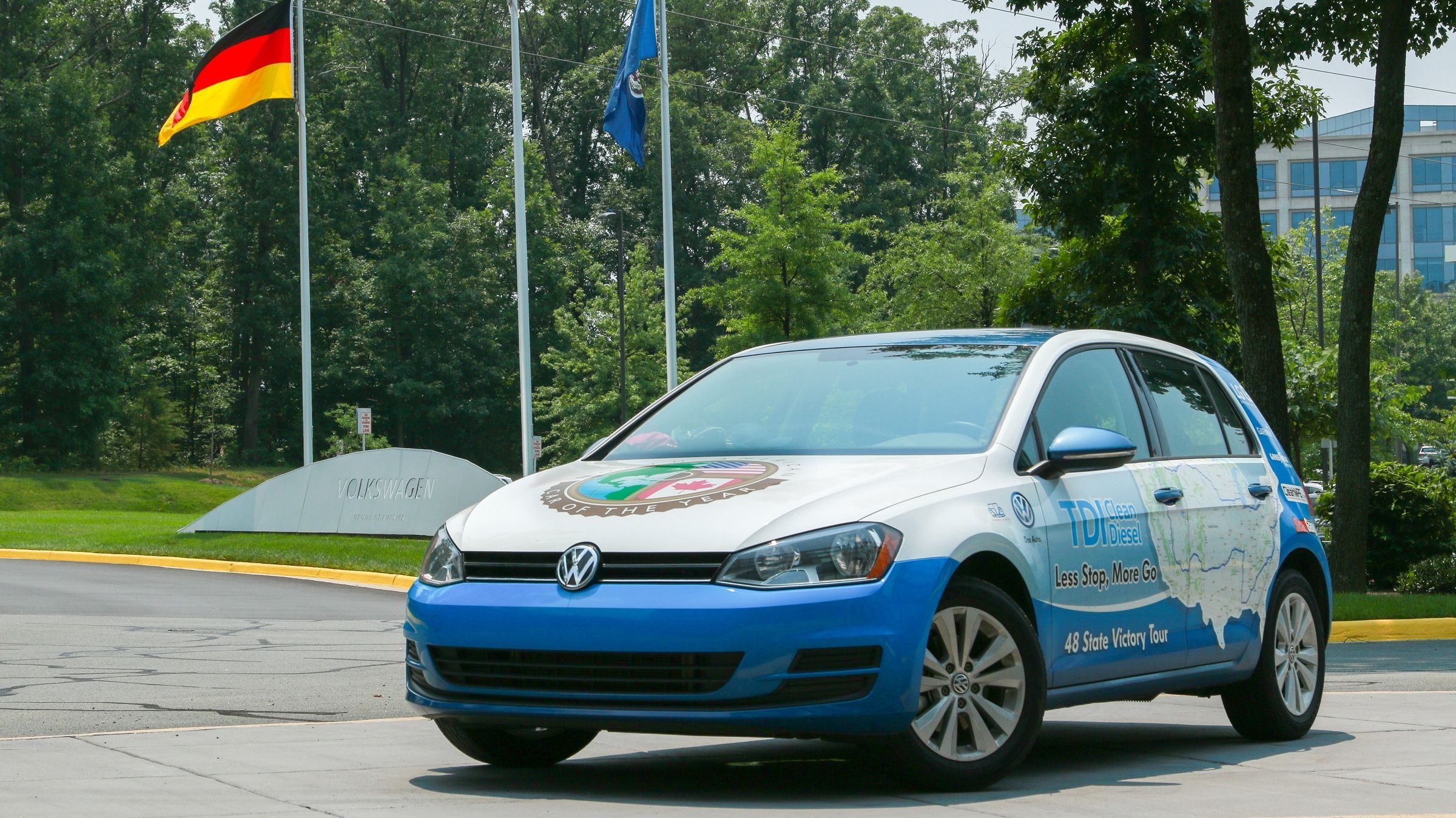Yet another Guinness World Record->ke1948 for fuel economy was recently announced, this time coming from the U.S. and the folks over at VW.->ke94 The latest is that a 2015 Volkswagen Golf TDI managed to set a new benchmark in the category of “lowest fuel consumption – 48 U.S. contiguous states for a non-hybrid car” by eking out 81.17 mpg, besting the previous record of 77.99 mpg. The super-efficient run even managed to beat out the standing hybrid vehicle record of 74.34 mpg.
The Golf->ke164 managed to visit each of the 48 contiguous states in an 8,233.5-mile mega-journey that lasted 16 days and burned just 101.43 gallons of diesel fuel. Only $294.98 was spent on fill-ups.
The record-setting vehicle set off from the Volkswagen of America headquarters in Herndon, Virginia, on Monday, June 22nd, returning a little over two weeks later on Tuesday July 7th.
At the wheel was Wayne Gerdes, an automotive journalist and the founder of cleanmpg.com. Gerdes has extensive experience in the realm of hypermiling, having set mileage records in more than 100 different vehicles, including the previous record of 77.99 mpg set in 2013 driving a 2013 VW Passat->ke224 TDI. Bob Winger, an electronics engineer involved in energy and conservation projects, joined him as co-driver.
The car was outfitted with Goodyear low rolling-resistance Fuel Max tires, a Linear Logic ScanGauge II device to measure fuel economy, G4 smartphones from LG and a GPS nav system from Garmin to meet the Guinness tracking requirements.
Continue reading for the full story.
Why it matters
When equipped with a six-speed manual transmission, the Golf TDI returns a manufacturer-claimed 45 mpg on the highway, which makes this new record pretty remarkable. It’s testament to Gerdes’ hypermiling practices, and proves that when it comes to getting the most distance out of your gas tank, it’s not so much what you drive as how you drive it.
In a press release, Gerdes said that he doesn’t think people realize the huge fuel saving potential available through VW’s line of TDI diesel engines. “In our experience, it is possible to get truly impressive mileage results by using just a few simple fuel-saving techniques,” he said.
So then, what are these techniques? The press release doesn’t go on to illustrate, but there are a few things we can share from our own experiences.
Overall, the key to high mileage is not one thing, but a variety of things combined. First, make sure your car is properly maintained. Simple stuff like a dirty air filter can hinder your engine’s performance. Next, make sure your tires are properly inflated, as low tire pressure can create higher rolling resistance. Make sure your car is as light as possible – you don’t want to spend extra fuel because you’re carrying around your entire collection of Road&Track in your trunk. Make all your inputs as smooth as possible, and focus on conservation of momentum – jerky acceleration and deceleration can make a big difference. Finally, make sure your car is as aerodynamic as possible, without stuff like bulky antennas or aftermarket parts catching the wind at speed.
These are just a handful of techniques you could use to get the most from that precious dino juice, whether you’re driving a Golf TDI or Chevy Corvette.->ke1280
Clearly, interest in hypermiling is growing, as several other automakers are keen to set records of their own. Honda,->ke34 for example, recently set its own Guinness World Record by averaging over 100 mpg in a Civic->ke236 Tourer that visited each of the 24 contiguous EU countries, while Audi->ke14 managed to set a different Guinness World Record by sending an A6 TDI to 14 different countries on a single tank, averaging 75.9 mpg in the process.
It’s all vaguely reminiscent of the constant one-upping seen with lap times at the Nurburgring->ke999 (back when that was still a thing).
Will accomplished hypermilers one day see the same fame as racing drivers? Will a hypermiler’s ability to get up to freeway speeds on a whiff of fuel rival a racing driver’s skills off an apex? Will the SCCA open up a new category for ultra fuel-economy competition?
So far, gas prices aren’t looking too bad. But once all this cheap fuel starts to get more expensive again, maybe the above scenarios will become a reality.
2015 Volkswagen Golf TDI
Read our full review here.

